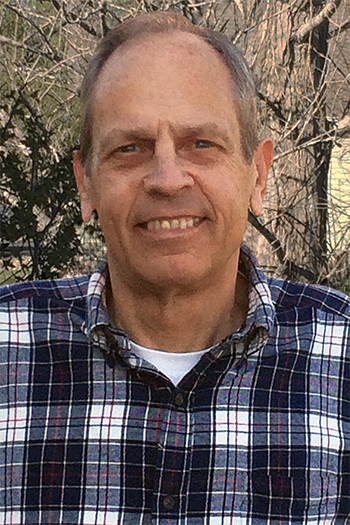Esophageal Cancer Survivor
Focus on the end game

An esophageal cancer diagnosis at age 56 stunned Mike Lynn. Though treatment was challenging, it was also successful. Today he has no evidence of disease. He credits his strong support system with helping him manage the physical and emotional challenges he faced along the way.
A few years ago, I found myself unable to eat a normal meal without having trouble swallowing and feeling symptoms of heartburn; plus, I was losing weight at an alarming rate without trying. I went to see my doctor, who scheduled an endoscopy to look for the cause.
The results were shocking. I was diagnosed with Stage IIIB esophageal cancer—specifically, a locally advanced, poorly differentiated adenocarcinoma. The tumor was situated in both my esophagus and stomach. It had reached the outer layer of my esophagus and spread to two adjacent lymph nodes, but it had not yet reached any other major organs. The doctor gave me a 15 percent chance of survival.
My wife, Kay, and I walked out of the hospital in shock, not knowing what to say or do. We went to a local coffee shop, and I started to cry. Kay held me in her arms and suggested that we pray. When we finished praying, we instantly felt a warm peace engulf us. We knew that no matter what happened, we would be okay.
We made an appointment with a thoracic surgeon. He and his team performed several more tests and procedures, and 39 days after my original diagnosis, they confirmed I had esophageal cancer.
My medical team explained the recommended treatment plan. It included 28 days of radiation with chemotherapy at the beginning and end, followed by a surgical procedure six weeks later. I knew the treatments would challenge my physical and mental strength and that I had the fight of my life ahead of me, but Kay and I agreed without hesitation to follow the plan.
The radiation treatments took only about 20 minutes per day and were painless. However, one critical side effect was dehydration, so the doctors rehydrated me intravenously every three days. For the chemo treatments, I received a four-hour infusion, and then the doctors sent me home attached to an infusion pump for the next three days. Because I am a Type I diabetic, the chemo treatments were difficult. My blood chemistry would become unbalanced, resulting in severe vomiting, hiccups and overall discomfort. During the six weeks of treatments, I lost 25 pounds and became mentally foggy; however, my emotional state was always positive and hopeful, and my family and friends kept me focused on the end game, which was a cure.
Six weeks after my radiation and chemo, I had a PET scan to check my progress. Thankfully, the scan indicated no detectable cancer. But the doctors advised me to have the planned surgical procedure because it was the best chance for a long-term cure, so Kay and I agreed.
The procedure removed two-thirds of my esophagus, one-third of my stomach, 23 lymph nodes, and my gallbladder. The surgeon then stretched the remaining stomach to connect with the remaining esophagus just below my neck. I’m so thankful we decided to have the operation because the surgeon removed live cancer cells from two lymph nodes.
It took me about one year to recover, and I then followed a five-year monitoring schedule to watch for recurrence. All evaluations indicated no evidence of cancer. Hallelujah! I was cured.
I've now been many years with no evidence of disease. I still have eating issues due to my unusual digestion path; however, the issues are manageable and minor compared to the alternative. For me, battling cancer in isolation was not an option. Kay told me to relinquish my pride and self-control during and after treatments and to let others help. She was indeed correct because I needed to focus my strength and emotions on overcoming the difficult trials and leave the details up to others. I relied on my faith, family, friends and physicians to keep me spiritually, emotionally and physically balanced.
My best advice? Don’t try to fight cancer alone. It’s okay to accept help.


